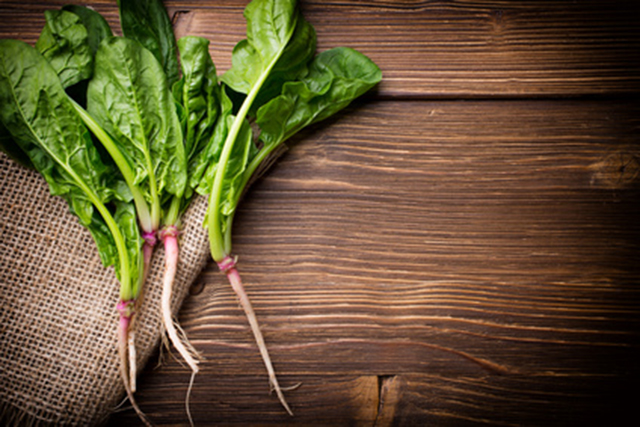There are so many reasons to eat spinach. It is part of the cruciferous vegetable family and is well known as one of the most nutritious vegetables on the planet. It is packed with almost every nutrient imaginable, and with nutrition comes health benefits.
Let’s take a look at 10 reasons to eat spinach.
1. Anti-inflammatory:
Spinach ranks among the highest in flavonoids and phytonutrients, which are compounds that have powerful anti-inflammatory properties. Foods with anti-inflammatory properties are highly regarded because of their ability to reduce pain associated with inflammation, and their potential to help prevent serious diseases including many types of cancers.
2. Antioxidant rich:
The flavonoids and carotenoids in spinach provide powerful antioxidant benefits. Antioxidants protect the body from the effects of oxidative stress, which may help strengthen the immune system and ward off diseases. Dr. Andrew Weil explains, “Oxidative stress is the total burden placed on organisms by the constant production of free radicals in the normal course of metabolism plus whatever other pressures the environment brings to bear (natural and artificial radiation, toxins in air, food and water; and miscellaneous sources of oxidizing activity, such as tobacco smoke).” The effects of oxidative stress are linked to many types of cancers.
3. Bone health:
Spinach is rich in vitamin K, which is essential to bone health. Just one cup of spinach contains 181% percent of the recommended daily value for this bone healthy vitamin. First of all, vitamin K prevents excessive amounts of osteoclasts, which are cells that destroy bones. It also promotes the production of osteocalcin, which is an essential protein for the bones. Spinach contains calcium and magnesium, which are key bone health nutrients.
4. Eye health:
Spinach contains two antioxidants called lutein and zeaxanthin, which protect the eyes from age, related diseases like macular degeneration and cataracts.
5. Heart health:
Spinach is great for the heart. The antioxidants in spinach keep the heart healthy by preventing the disease causing oxidation of cholesterol. Oxidized cholesterol is dangerous to the heart and the arteries.
6. Lowers blood pressure:
Potassium is known for helping to lower and regulate blood pressure. One cup of spinach contains 167 mg of potassium, which is 5 percent of the recommended daily value.
7. Gut health:
Spinach is a great source of fiber and water. Both of these help promote regularity of the digestive tract and helps prevent constipation.
8. May help fight cancer:
The flavonoids and phytonutrients are powerful anti-cancer agents, and research confirms it. A Chinese study showed that spinach extracts have the ability to inhibit cell division in stomach cancer cells. Another study by the National Institute of Environmental Health Sciences (NIEHS) showed that spinach extracts were able to reduce skin cancer. A second NIEHS study showed that the dietary intake of spinach may reduce the risk of developing breast cancer. Spinach is also rich in carotenoids, which according to an Australian study has been linked to the decreased risk of prostate cancer.
9. Skin health:
Spinach is a good source of vitamin A, which promotes healthy skin. Vitamin A helps the skin stay healthy by helping it retain moisture. Just one cup of spinach provides 337% of the recommended daily value for vitamin A.
10. Weight loss:
Spinach is high in dietary fiber, which is important for weight loss. It aids in digestion, helps with low blood sugar, and helps you feel full faster, so you eat less. One cup of spinach only contains 7 calories as well, making it an ideal low-calorie, high fiber food for a weight loss diet.
Note: None of the information in our website is intended to diagnose, treat, cure or prevent any illness or disease. The content on our website is for educational purposes only.
For an alkalizing and savory spinach smoothie.
For a cilantro and spinach detox smoothie.
REFERENCES:
1. “A Prospective Study of Dietary Flavonoid Intake and Incidence of Epithelial Ovarian Cancer.” National Center for Biotechnology Information. U.S. National Library of Medicine, Nov. 2007. Web. 21 May. 2015.
2. “Intake of Carrots, Spinach, and Supplements Containing Vitamin A in Relation to Risk of Breast Cancer.” National Center for Biotechnology Information. U.S. National Library of Medicine, Nov. 1997. Web. 21 May. 2015.
3. “Effects of Spinach Powder Fat-soluble Extract on Proliferation of Human Gastric Adenocarcinoma Cells.” National Center for Biotechnology Information. U.S. National Library of Medicine, Dec. 1999. Web. 21 May. 2015.
4. “Topical and Oral Administration of the Natural Water-soluble Antioxidant from Spinach Reduces the Multiplicity of Papillomas in the Tg.AC Mouse Model.” National Center for Biotechnology Information. U.S. National Library of Medicine, May 2001. Web. 21 May. 2015.
5. “Do Dietary Lycopene and Other Carotenoids Protect against Prostate Cancer?” National Center for Biotechnology Information. U.S. National Library of Medicine, Mar. 2005. Web. 21 May. 2015.
6. “Stumped by Oxidative Stress?” DrWeil.com. DrWeil.com, n.d. Web. 19 August 2013.
7. “What Are the Health Benefits of Spinach?” Medical News Today. MediLexicon International, n.d. Web. 21 May 2015.

















